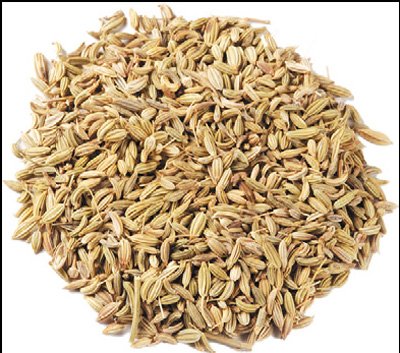Fennel
Ayurvedic Medicine

Fennel
Fennel (E), Sounf (H):
Its name shatapushpa means 'one hundred flowers'. Its other name Madhurika- means 'the sweet one'. This is another member of the Umbelliferae family that aromatically warms digestion. Like its flower head it spreads and moves outwards, thus preventing congestion and stagnation in the centre.
Digestion Digestive discomfort; flatulence, borborygmus, cramps, nausea and low agni. Although a heating herb, it benefits digestion without aggravating pitta. In fact its sweet post-digestive action leaves a residual cooling effect. A specific herb for inguinal hernias and lower abdominal pain. It relaxes the smooth muscles and is a specific herb for lower abdominal pain from lower bowel tension. Fennel water is used for colic in babies. Urinary Cystitis, difficult urination, burning and dark yellow urine, cloudy urine. Its diuretic properties clear pitta from mutravahasrotas. Nerves Use fennel when nervous tension in mamsa dhatu and contraction in the smooth muscle system restricts the flow of vata. All spasms are relieved by fennel, especially in the GIT, lungs and uterus. Its nourishing effect on majja dhatu tonifies the brain and nervous system. Lungs Useful in vata–kapha obstruction type cough. Helps to clear phlegm by reducing aggravated avalambaka kapha that congests the alveoli and bronchioles. Gynaecology Its specific effect on rasadhatu can increase the flow of milk in lactating mothers. Useful in menstrual difficulty caused by vata and kapha obstruction in the lower abdomen with pain, cramps and a dragging sensation.
 Myrrh
Myrrh Rhubarb
Rhubarb Vamsa Lochana
Vamsa Lochana Vasa
Vasa Sandalwood
Sandalwood Saffron
Saffron Karavella
Karavella Kanchanara
Kanchanara Coleus
Coleus Coriander
Coriander Senna
Senna Cloves
Cloves Test your English Language
Test your English Language  Benefits of Collard
Benefits of Collard Weird Place Names
Weird Place Names Valentines Day Party Idea
Valentines Day Party Idea Benefits of Kiwi Fruits
Benefits of Kiwi Fruits Horse Breeds
Horse Breeds Xmas Facts
Xmas Facts Benefits of Potatoes
Benefits of Potatoes Benefits of Mangosteen
Benefits of Mangosteen




